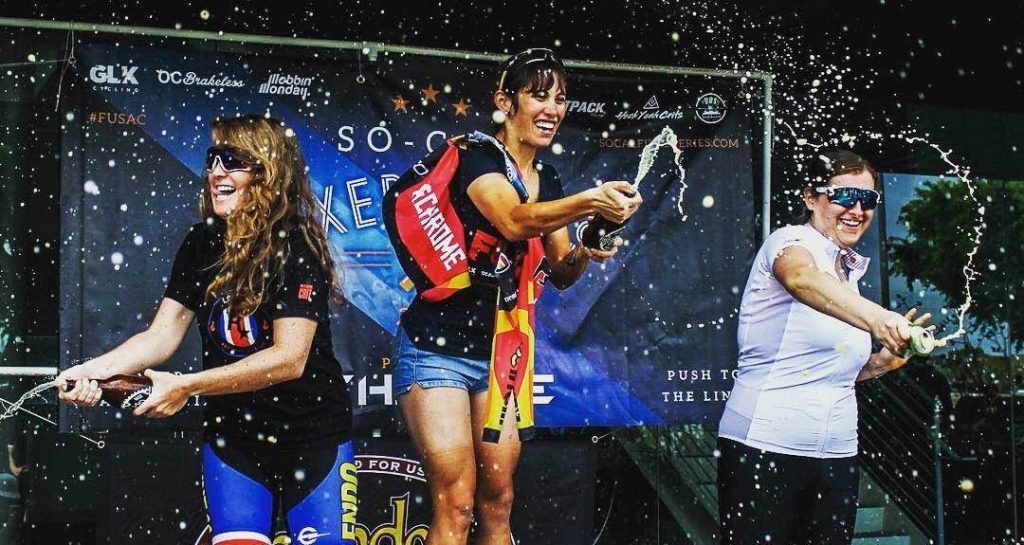Jo Celso is a Cat 1 road, track and fixed-gear crit racer racing for Cinelli Chrome and currently residing in Oakland, California.
Growing up, I was the kid who got excluded a lot.
I was chubby, extremely tall, remarkably unathletic and generally awkward.
My parents were both first generation immigrants – my dad from the Philippines, my mom from Australia. My mom was trying to get through college while I was in middle school, which meant we were really broke a lot of the time.
I didn’t get a whole lot of fancy stuff and wore a lot of second-hand clothing. I was chronically uncool, and my social calendar was left pretty empty.
It also made me an easy target for bullies.
Some of the cheerleaders and their boyfriends constantly made fun of my appearance; I switched to independent study in high school because the social environment was so hostile to outcasts.
Finding a place
As an adult, I found my niche in bikes. I’m actually a great cyclist. I’m outspoken in my community, and, for whatever reason, people actually want to hear what I have to say.
I’ve, at this point, integrated myself pretty strongly into the bike community, and now have a huge circle of acquaintances, friends, allies and people I’m proud to call second family. It’s a little uncomfortable to admit these things about myself, but it’s also disingenuous and irresponsible to pretend that I don’t come from a position of some influence.

Jo Celso celebrates a win at a fixed gear race this year along with a diverse podium of riders in terms of body type and races, she said. Photo by Nyrah Hearts.
It’s funny; as an adult, you assume people grow out of the terrible mindset of judging others based on their “coolness.” We describe that mindset as “childish” all the time, only, in some people, it really grows with them instead of quitting when they enter adulthood.
Sometimes, it almost feels like it’s worse in communities like cycling, where so many people who were bullied and excluded find themselves suddenly in the “in” crowd.
I’ve been told not to ride or even hang out with fellow cyclists because they might hurt “my image” as an athlete; at points, I’ve been warned about both my best friend and boyfriend, as if I’d value some online persona more than the people I love.
Mean girls and boys
I’ve been to a number of conversations on rides and at races making fun of the way someone is dressed (it might be the only kit they have!) and what kind of bike they’re riding, as if creating the Mean Girls – and boys, most certainly – of cycling is a desirable thing.
It’s almost amusing, in a sad way, that people in their mid-20s and on still rely on petty social tactics. It makes me wonder what my bike friends say about me when I’m not around.
As someone from a position of some influence in the cycling community, I want to make something clear: If we are friends, or if we could even possibly be friends, you are welcome to my events, my group rides, my social life.
Everyone or no one
My mother has this saying: “everyone plays or no one plays,” and that’s a rule, in my book.
I don’t want to go to events, or be privy to circles where people in my community seek to keep others out because they’re not in the “in” crowd. It makes me angry when cliques choose to be insular and selective about who’s allowed to hang out because they seek to create an elite group.
The community I want to help foster doesn’t leave others out because they’re not popular or “cool.”
An inclusive, unified community is more attractive and beneficial to everyone.
Newcomers are more likely to get involved in a sport where no one feels excluded; this is doubly true for women and other minorities who are already weary of everyday exclusion. More people equals more races, more ride buddies and more sponsors.
For the good of the sport
Nobody wants to invest in a culture of elitism and exclusion, where newcomers avoid involvement for fear of being embarrassed or ostracized.
I expressed this sentiment more briefly on my personal social media account, primarily as a means to communicate my feelings on an overall trend and encourage those who actually do get excluded.
It’s funny: while the overwhelming response was positive, a few people argued against inclusion. Some (men) tried to conflate creating minority safe spaces, like women’s only clinics, with excluding people based on “coolness;” ironic, seeing as minority safe spaces are intended to empower those who are traditionally socially excluded by the mainstream.
Maybe there will always be people who seek to justify the act of excluding others; I, for one, will always choose not to be.
Main photo: Jo Celso visits the North Star Velodrome in Blaine, Minnesota. “[It is] one of the nicest and most inclusive communities I’ve seen so far,” she said.